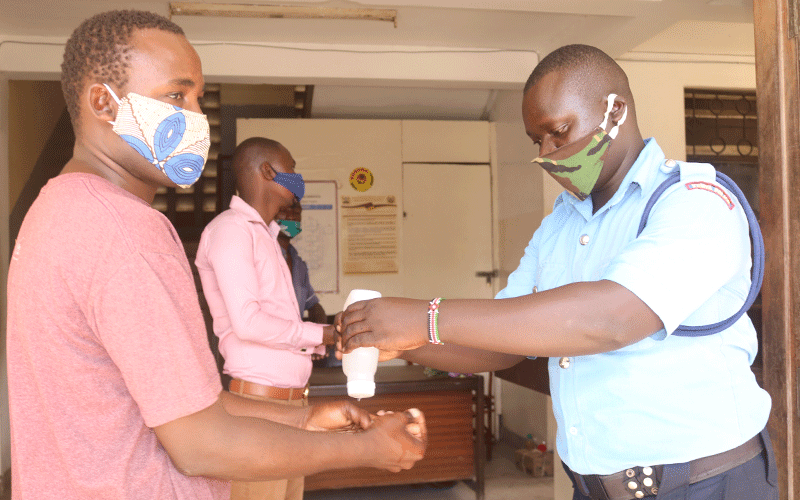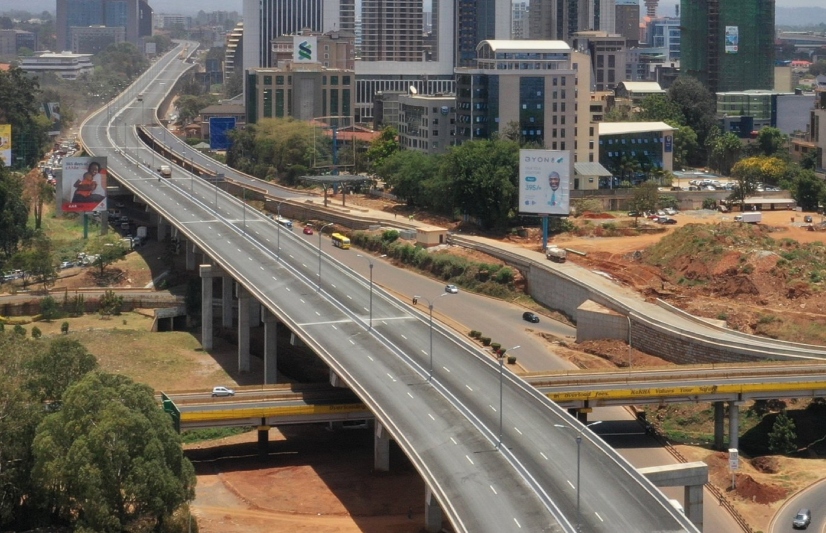Police stations join weaker links in anti-coronavirus war

Zadock Angira, Sophie Njoka and Baraka Karama
Police stations across the country are emerging as some of the weakest links in the fight against Covid-19 given the rising number of deaths of officers and inmates.
Former Bondo sub-county police commandant David Wafula who passed way a week ago is the latest police officer to succumb to the virus, raising fears of the potent threat of infections within police facilities due to overcrowding without any regard to containment measures put in place by the government.
Since officers are tasked with enforcing Covid-19 rules and regulations, they are at the greatest risk of contracting the disease, and the stations are also emerging as potential spreading zones of the disease.
The situation is further exacerbated by the rising cases of arbitrary arrests and prolonged detentions even in cases where suspects are not supposed to be locked in.
In a bid to decongest the prisons, some of the police stations have been turned into remand centres.
When People Daily toured Pangani Police Station in Nairobi on Saturday, we found at least 54 suspects crammed in the cells as their cases remain pending before court.
A team of doctors from the Medicines Sans Frontiers had to rush to the station to attend to two suspects whose conditions had seriously deteriorated.
The challenge is experienced across the country. However, it remains a great challenge to observe the social distance inside the police vehicles that ferry suspects arrested from various crackdowns.
A spot check by the People Daily revealed how police officers and suspects were at equal risk of contracting Covid-19.
In Bondo, all officers and other staff have been subjected to compulsory Covid-19 tests following the death of their boss.
Siaya County Police Commander Francis Kooli yesterday said the directive had been issued for the safety of the officers and their families.
The exercise that kicked off on Saturday morning has seen officers both from the Regular Police and the Critical Infrastructure Protection Unit (CIPU) together with chiefs and assistant chiefs tested.
Recent reports indicate that Wafula had recently returned to Bondo after being with his family in Nairobi after lockdown was lifted by President Uhuru Kenyatta.
“Wafula had escorted his familiy back to Nairobi after the lockdown was lifted and he just returned last week,” said Siaya County Commissioner Michael ole Tialal.
The efforts notwithstanding, investigations have also revealed that some officers and station commanders were making arbitrary arrests and still detaining the suspects despite the Covid-19 threat.
Six suspects
On Tuesday night last week, six suspects escaped from Karuri Police Station cells in Kiambaa, Kiambu County.
The local police commander said only one of them, a murder suspect, had been charged with a serious offence.
The escape could have been well planned as the suspects had been detained at the station for about three months.
At the same station, the commander revealed, there were 20 other remandees who did not manage to escape.
Last week, police in Nyandarua raised concern over increasing congestion in the cells occasioned by remand centres rejecting inmates over space and lack of Covid-19 clearance certificates.
Quarantine centres have been established at Naivasha, King’ong’o, and Nakuru Prisons where newly sentenced inmates are held for 21 days before being transferred. However, the facilities are already full.
Due to the threats, some stations have come up with measures to contain the spread.
The Mombasa County Police Commander Augustine Thumbi yesterday said police officers have been trained on personal safety precautions, such as procedures for hand-washing, sanitising surfaces and work equipment like guns, and identifying symptoms of Covid-19.
“With the ongoing testing, no police officer in Mombasa County has tested positive for Covid-19 and this is a plus for our officers, since they seem to be sticking to laid out procedures in the fight against Covid-19,” he said
At the Shimo La Tewa Maximum Prison, the authorities have set aside an isolation centre where new inmates were held for 14 days in isolation to avoid the risk of spreading the virus inside the prison.
“Making arrests is now transitioning, from being a common tool being used by law enforcement, to becoming literally a tool of last resort, since the more number of inmates being held in congested cells the more danger they pose both to our officers and the entire public,” he said.
The digitisation of services will also ensure that there is minimal interaction between the police and members of the public.
Inclusive approach
“We are slowly adapting to the digital way of working. As much as operational policing has to be on the street, police officers are learning how to fight crime remotely through online surveillance,” Nthumbi said.
“With these enforced circumstances due to Covid-19, they offer transformational opportunities for our police officers to begin fighting crime using online services and only respond to the physical need whenever there is need to reduce the risk of contracting and spreading Covid- 19”, he added.
Kisauni sub-county police Commander, Julius Kiragu, said the pandemic had strengthened the need for more collaborative ways of working partnership across the public and private sectors towards a more inclusive approach that embeds societal responsibility in the fight against crime.
In Kisumu, elaborate measures have been put in place to ensure the safety of the officers and inmates.
Kisumu Central OCPD Peter Katam fumigation in various police cells within the region was done after every 24 hours. Thermoguns and sanitizers have also been put in all police stations.
Maraga directed that petty offenders should be released on bond or cash bail and that the station commanders were under strict instructions to implement these directives.
“For the sake of transparency, all police stations will have centralized records showing the number arrested and the terms of their release. The ODPP will monitor the exercise periodically,” the CJ said.
Police headquarters has also directed the station commanders that with regards to new arrests, all cases except serious ones will be dealt with at the police stations in accordance with the guidelines issued by the Inspector General of Police.
The suspects are expected to be granted affordable and reasonable bonds terms or free police bonds, especially those accused of minor offences.
Arrests of suspects are to be made when investigations are complete unless circumstances dictate that a suspect be arrested to facilitate investigations.
The commanders had also been directed to strictly adhere to the directives on the Bail and Bond Charter which requires, among others, that petty traffic offenders will not be put in custody or forced to pay cash bail.












